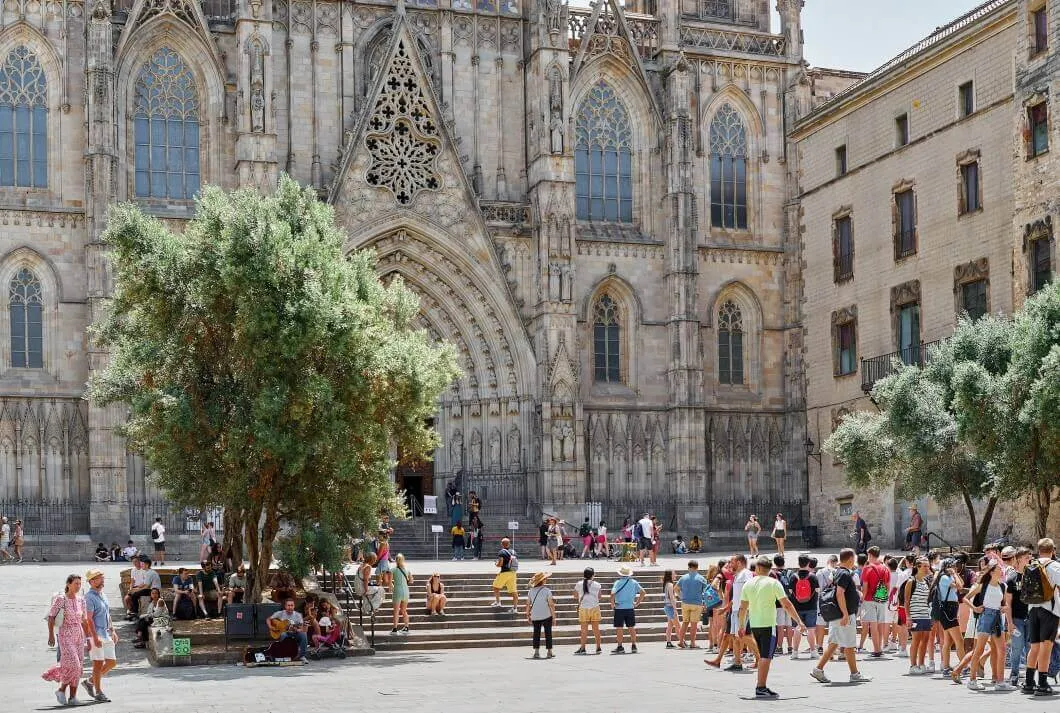
The return of tourism after the pandemic results in civil unrest and social movements whose aim is to limit the number of visitors to the city. Mass tourism has returned to Barcelona in full strength and residents are not very happy about it.
Experts and businessmen differ in their opinions regarding the situation, but they agree that, despite the speeches at the beginning of the health crisis, the sector has not changed: "In favor of recovery, we can see even faster growth than before," says Asunción Blanco, professor at the Department of Geography at the Universitat Autònoma de Barcelona (UAB). Academics who defend some limits to tourism consider it fundamental in the context of climate emergency and energy crisis: "If we don't plan for it, it will end up coming to us suddenly," warns Blanco.
In 2019, Barcelona set a historical record by welcoming 12 million tourists, 5% more than in the previous year. "The pandemic has not changed the paradigm, on the contrary. We are back to the same thing and with much more desire to grow and restore the same dynamic," says Claudio Milano, anthropologist, and professor at the UAB.
Besides the negative impacts of mass tourism pointed out by the experts, including pollution from cruise ships, congestion and the privatization of public spaces, job insecurity, the commodification of housing and the loss of local businesses, there is the danger if a planned decrease is not achieved, since it will have to be forcibly imposed: "Current uncertainties should alert us; we cannot reproduce the same level of dependence on tourism again," says Ernest Cañada, a postdoctoral researcher at the University of the Balearic Islands (UIB).
Regulation, and ultimately decline, is a scenario which has been proposed with a view of preserving the industry itself: "We must put measures in place or risk killing the goose that lays the golden egg," emphasizes Blanco. Until now, some of the measures adopted by the public authorities, mainly the City Council, have been aimed at redistributing the visitors, either with operating outside traditional tourism seasons, or with the promotion of areas off the beaten track. Cañada dismisses these speeches as "euphemisms" and argues that "massification is not resolved by taking tourists to more places", but rather contributes to deepening the process of loss of public spaces”.
However, to deal with the decrease in tourism, a "social pact" or State agreement would be necessary, between all the institutions and also the sector itself, which would allow progress in consensual planning and with long-term measures. "The decrease is not a slowdown nor is it abolishing tourism. The question is how it is managed," Blanco points out. To get there, an agreement would be needed between the local administration, including the city council and the metropolitan area, the Generalitat (the local Government) and the State to think of long-term measures, including economic diversification to reduce dependence on tourism.

This pact ought to allow work to be done along three lines: on the one hand, a reduction of mass tourism in the most crowded areas, with agreed and coordinated processes between the different administrations; diversification of the economic activity of the parts which are most dependent on tourism; and also transforming the sector itself to adapt it to the challenges posed by the climate crisis, promoting short routes and rethinking the leisure areas of the majority of the population.
One of the main issues at the moment is economic dependence on the tourism sector, which represents 12% of GDP in both Barcelona and Catalonia. “The city model should be changed to eliminate tourist monoculture, which has made cities like Barcelona suffer the most during the pandemic,” Milano points out.
On the other hand, the ways that would make it possible to implement a de facto decrease in tourism would be to reduce the accommodation available in the city, restrict access routes, that is, limit air and sea transport, and reduce international promotion.










